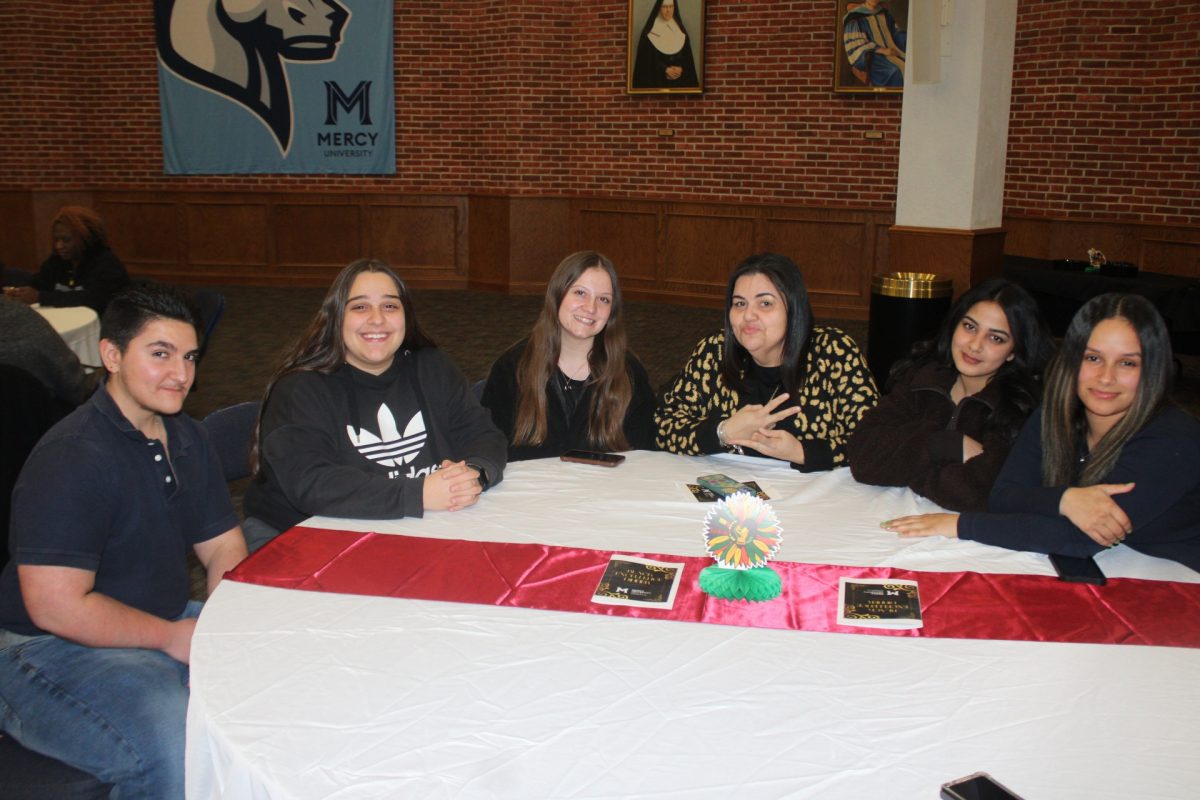Renowned hip-hop artist Shaun Boothe dazzled at the crowd as Mercy University students and faculty gathered at Mercy Hall Rotunda to honor and celebrate Black History Month by hosting the Black Excellence Dinner on Feb 8.
February is a time or remembrance in the Black Community. Mercy has joined the effort to commemorate the contributions made by black Americans in shaping America. Some feel the Black experience is often untold in this country, which is why events like this generate a lot of attention on campus.
Boothe, a prominent figure in the hip-hop world guided the audience in unison with renditions of popular artists such as Bob Marley and Tupac Shakur. Mercy students and faculty alike joined in on renditions of timeless songs such “Buffalo Soldier” by Marley and “Dear Mama” one of Shakur’s most famous hits.
Serena Williams and Muhammed Ali, two of the most successful athletes in their sports respectively were both recognized. Williams and Ali are just as revered for their accomplishment’s away from the game as in tennis and boxing.
Ali, who was stripped of his boxing World Heavyweight championship for refusing to join the Vietnam War later became a national hero after public opinion about the war changed. Williams has fought vigorously for the equal treatment of women in sports.
“So, to me, Muhammad Ali was ‘The Greatest’ not because of the fighting you saw him do in the ring, it’s who he stood for and who he was willing to fight for out of that ring, that’s what made him ‘The Greatest,’” Boothe said in a press release. “He cared about people on the other side of his dinner table the same way he cared about people on the other side of the planet.”
Mercy University President Dr. Susan L Parish began the evening with a riveting speech about the importance of celebrating Black History Month.
“Every sector of our nation benefits from black excellence,” said Parish. “This month though reminds us to amplify stories that are too often unheard. And we must celebrate and remember the pioneers who blazed trails that allow us to be here”
Mercy’s diversity was on full display as individuals from different walks of life came out in strobes for a similar cause. A celebration of the accomplishments of individuals from the black community, not only on Mercy’s campus but around the world.
Fried chicken, macaroni and cheese, collard greens, baked chicken and corned bread topped off with a side of homemade sweet tea were served in abundance. “Sylvia’s Restaurant of Harlem,” a staple of New York City’s black culture since the 1960s, provided the 110 attendees with traditional gourmet served within the black community for generations.
During refreshments, Mercy students had an opportunity to mingle and reflect on the experience. Mercy freshman, journalism and film major Haylee James, said, ” I really liked his speech and his rap it really encapsulated back culture and his passion for black culture, and I enjoyed how he spotlighted historians like Bob Marley. The event really good”.
Mercy ranks fourth in the U.S. in granting bachelor’s degrees to black students among all private non-profit in person schools. Racial diversity is strong at Mercy. Amost 25 percent of Mercy’s population identify as black.
Mercy hosted a webinar on Valentine’s Day by the School of Nursing. There is a Black Excellence Lunch on Feb. 28 at 1 p.m. on the Bronx Campus.
There were various events still occurring on campus this month, including Black History Month Trivia, Paint and Sip on the Manhattan campus, and various events regarding Black music and film.
The precursor to Black History Month actually began with a celebration dating back to the second week of February in 1926. That week was picked due to the birthdays of Abraham Lincoln and Frederick Douglass. Earlier recognitions date to 1897, when activist Mary Church Terrell convinced the Washington D.C. School Board to celebrate Douglass’ birthday in schools, according to the Association for the Study of African American Life and History. Through various celebrations existed for decades, students and educators from Kent University proposed the month in 1970. President Gerald Ford recognized it as a national holiday in 1976.









